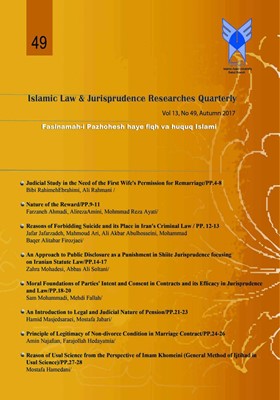-
-
List of Articles
-
Open Access Article
1 - Judicial Study in the Need of the First Wife's Permission for Remarriage
Bibi Rahimeh Ebrahimi Ali Rhamani -
Open Access Article
2 - Nature of the Reward
Farzaneh Ahmadi Alireza Amini Mohammad Reza Ayati -
Open Access Article
3 - Reasons of Forbidding Suicide and its Place in Iran's Criminal Law
Jafar Jafarzadeh Mahmoud Ari Ali Akbar Abulhosseini Mohammad Baqer Alitabar Firozjaei -
Open Access Article
4 - An Approach to Public Disclosure as a Punishment in Shiite Jurisprudence focusing on Iranian Statute Law
Zahra Mohadesi Abbas Ali Soltani -
Open Access Article
5 - Moral Foundations of Parties' Intent and Consent in Contracts and its Efficacy in Jurisprudence and Law
Sam Mohammadi Mehdi Fallah -
Open Access Article
6 - An Introduction to Legal and Judicial Nature of Pension
Hamid Masjedsaraei Mostafa Jabbari -
Open Access Article
7 - Principle of Legitimacy of Non-divorce Condition in Marriage Contract
amin najafian faraj allah hedayat nia -
Open Access Article
8 - Reason of Usul Science from the Perspective of Imam Khomeini (General Method of Ijtihad in Usul Science)
Mostafa Hamedani
-
The rights to this website are owned by the Raimag Press Management System.
Copyright © 2021-2026







